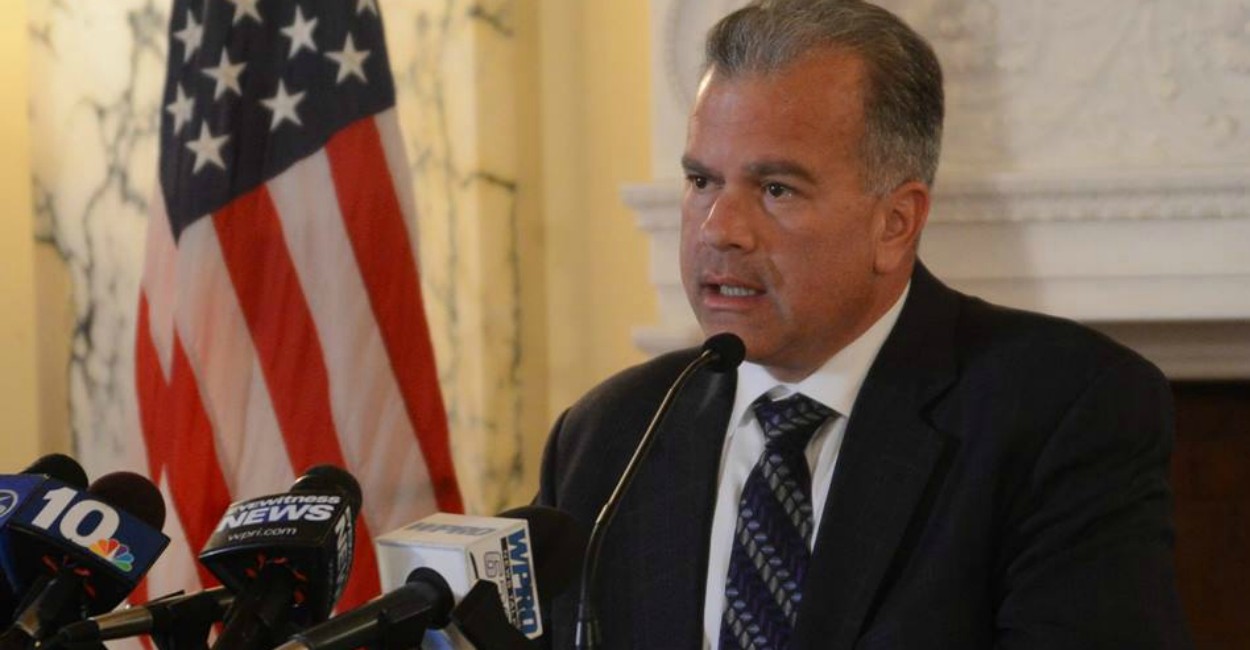The real news has hit the headlines, and the “you-know-what”
has hit the fan:
Former Speaker (now convicted felon) Gordon Fox not
only had ties to the 38 Studios deal, but he was wheeling and dealing in backroom
deals (secret warp zones?) before Curt Shilling approached Rhode Island
Republican Governor Don Carcieri about a loan.
Former House Speaker Gordon Fox ordered
the head of the state’s economic-development agency to put together the deal
that lured Curt Schilling’s 38 Studios to Rhode Island, state lawyers contend
in a court filing newly unearthed by Target 12.
The lawyers say Fox held a private meeting
with Schilling and Tom Zaccagnino – a top 38 Studios board member – prior to
the oft-cited March 2010 fundraiser where Gov. Don Carcieri and Schilling
started discussing the company’s potential move.
 |
| Nicholas Mattiello (Facebook) |
Three
years ago, just after 38 Studios crashed, Carcieri broke his silence
and spoke with WPRI’s Tim White about his part in the company’s inception and
dysfunction:
I was a supporter. This was a lengthy
process. We had a board, twelve people that were leaders in the community. I’ll
take responsibility for it getting approved on my watch. There’s no doubt about
that.
He
then placed blame also with Schilling and his leadership, which the former
baseball player did not deny.
When a company fails, it’s the
leadership that’s responsible. Did it fail because it just needed some more
money or did it fail because they didn’t know what they were doing.
Level
One: Don’t float a government loan to any private entity, no matter how
trustworthy or established.
Despite
Carcieri’s own comments on the initial negotiations, the final tally has still
held Carcieri with the consequences. As of today, that is no longer the case.
WPRI
continues:
That fundraiser is
usually identified as the beginning of Rhode Island’s involvement with 38
Studios. But in the court filing discovered by Target 12, the state’s
lawyers make this disclosure: “Unbeknownst to Governor Carcieri, then-Speaker
of the Rhode Island House of Representatives Gordon Fox had previously met with
Defendants Schilling and Zaccagnino.”
Well. Well. Well.
Democrats
in the state house have been running on invincible stars for years, but the 38
Studios debacle was just one enemy too much for Rhode Islanders to take. Boston
Magazine reported on the
personal consequences of Rhode Island’s grim
“Game Over:
The company’s death was grisly: Before
going under, it defaulted on the $75 million guaranteed loan that the state of
Rhode Island had used in 2010 to lure it to Providence. As the money ran out,
the company encouraged its 379 employees to continue coming into work, even
though it knew it could not pay them. Staffers realized they’d been stiffed
only when they noticed the money missing from their bank accounts. A pregnant
woman had to find out from her doctor that her healthcare benefits had been cut
off.
Programmers
and designers were getting stomped on without knowing it, and one lady was
giving birth, not realizing until after delivery that she would have to pay up
on her own. Awful. Just awful.
Besides these personal tragedies, including the
wretched agony for Schilling and his family, plus personal contacts from former
employees to this writer, what else is it about 38 Studios that registers so
much attention and controversy?
Even in a state that long served as New England’s
Mafia headquarters — and a state whose best-known modern political figure,
Buddy Cianci, the former Providence mayor, was sent to prison in a federal
corruption case known as Operation Plunder Dome — the 38 Studios debacle has
registered as a painful embarrassment. (When I called influential Rhode
Islanders and told them I was writing about 38 Studios, virtually all of them,
even if they had opposed the deal, answered with some version of, “Do you have
to?”)
Rhode Islanders are used to being played by their
politicians. What makes them cringe is the suspicion that virtually all their
elected leaders might have been played by someone else.
Are Rhode
Islanders tired of the games? Are they tired of the entire political class
playing them like a video game from hell? Here comes the next question: besides
Fox, did anyone else in state house leadership have corrupt ties to this deal? What
about Speaker Nicholas Mattiello? He has already spoken out in favor of paying
back the “moral obligation” loans. He says that he wants the depositions on
the state lawsuit released to the public:
Mattiello, who has been roundly criticized for not
conducting his own investigation into the failed start-up that received the
bulk of a $75 million loan from a program passed by the legislature in 2010,
said he doesn't know anything about how the doomed deal came together. However,
he's asking now for information to be made public.
Yet no
investigation. Why?
Mattiello became Speaker shortly after the 38
Studios deal came together. He has balked at conducting his own investigation,
saying the House of Representatives is not an investigating body.
This
argument conflicts with then Speaker Fox’s statements in 2013, during questions on
WPRI, who understandably had similar shady reasons for not seeking an independent
investigation. He had the initially power to sign off on subpoenas, and refused
to: “It’s pursuant to the rules. Follow the house rules.” Asked if he would
recuse himself allow for subpeonas, Fox answered: “I could, and I’ve thought about it.” Then he
shared: “We in House leadership have started to do oversight into 38 Studios”.
House
leadership included then House Majority leader Mattiello.
With the
current speaker refusing to release even financial records relating to
his campaign funds, perhaps Mattiello is running out of lives in this
political game, just like his corrupted, incarcerated predecessor.
No comments:
Post a Comment